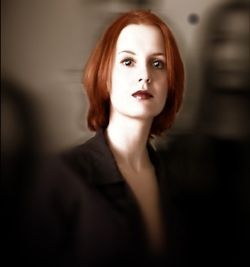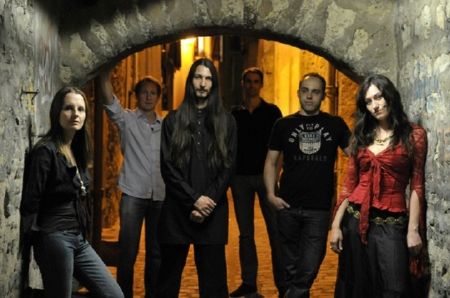
Interview by Si Smith

France had produced some great music over these past few years, and now has a new champion: a satisfying blend of pop, rock and general progressiveness that takes on board influences from all across the musical spectrum. Femme Metal spoke to vocalist Adeline to discuss how they found the perfect recipe for combining all those elements!
First off, a warm welcome to you from all at Femme Metal, and thank you for speaking with us today.
Thank YOU for your interest in what we do !
Before your arrival in the band in 2000, the band began way back in 1998 as many bands do, as a cover band. Do you know what kind of songs were being covered at the time?
I think they covered a few songs of Anathema, Moonspell, Yearning, Edge of Sanity… that kind of bands. As for me I had a cover band too in which I sang classic rock songs from bands such as The Cranberries, The Police, U2… That’s how they found me, they attended one of our gigs and they contacted me a few days later.
Your first couple of demos with the band, “Stanzas” and “Dreamland”, must have been relatively successful as you eventually landed a deal with Sacral production. Thinking back to those early demos, was the sound a lot different from what it is now? Or is it just a natural progression through the years?
Those demos sounded a little bit heavier than the music we play now and there were quite a lot of synths/electro inputs, but the “mellow” side of our music, that mix of rock, pop and metal, was already there. So were the flute and the percussions. It was more than ten years ago now, and at the time my bandmates were obviously much more influenced by the metal bands they covered a few years ago than they are now. In between they sort of abandoned things like the death metal growls and the electro inputs, and they gave the music a “progressive rock” feeling. Maybe because they managed to build through the years a common reference table in the composition process, where as ten years ago the music of Akin was more a raw mix of the very different musical influences of each member of the band.
France seems to have produced some successful progressive-edged bands in recent years, including Auspex, Qantice, Kalisia, Adagio and Spheric Universe Experience (to name but a few). Even Gojira (although much heavier) still hold on to a progressive influence. What do you think it is about the French culture that seems to launch this thirst for the progressive in music?
It maybe because the accent is put on the music rather than the lyrics. There might be a few exceptions but the lyrics are mainly in English which is not our mother tongue. What we find most interesting are the actual melodies, the rhythm, the harmony… That’s probably why the French are so interested in progressive music. That’s my guess anyway.
Considering these other bands, what do you feel Akin can bring to the scene that is different from the other bands of the genre, if you consider yourself “labelled” by a genre at all?
It maybe the variety of influences in our music. I personally listen to a lot of Sting and Tori Amos (and recently I found some interesting things in Lady Gaga’s music, please don’t hit me!), when other members of the band would be more into Dream Theater, Opeth or Anathema, for some others it would be the Beatles … It may also be the variety of instruments we use in our songs: we like to do experiments. In the end, we think that the music we play doesn’t belong to a genre in particular. Whether you’re fond of rock, metal or pop you might like our new album. We hope so in fact!
There was a long period between releases before the new album was birthed. What were you guys doing during this time?
We have had arguments in 2004 and the guys decided I wasn’t a fit in the group anymore. They therefore had to look for a new singer, which took them quite a long time. Then I know that a combination of different factors really slowed the band’s activity down : some members of the band had to move to Paris for professional reasons while the others lived in Lyon, some got married, became dads… And they also suffered several hard drive crashes where they lost a lot of data (there seem to be some kind of “Akin‘s curse” with computers…). They really planned to record the new album in 2008, and it took 3 years to record it because of those personal, technical and professional constraints.
This time round the album has been billed as “with a string quartet on the side”. In what ways did this affect the way the album was composed and recorded?
The string quartet brings harmonic texture to the songs. It kind of has the same function as the keyboard did on the previous album. Only it gives a more organic and Beatles feel to the music. The songs were pretty much finished before the arrangements were added.The strings were recorded separately and mixed into the songs.

There is also a wealth of other instruments on there – darbuka, djembe, dilruba, daf and tablas to name a few. What is the key to co-ordinating all these instruments do you think? Did you ever sing live alongside these musicians, or was it all recorded separately?
Adding these instruments was like adding relevant touches to spice up the album. We had already used a djembe on the previous CD’s and on stage and we thought it worked rather well. We had the opportunity of using other traditional instruments on this album and it felt natural to include them as long as they served a musical purpose.
You put a free 8-track version of the album up for free download at bandcamp.com (in fact all your previous releases are there for free download too). Did you receive any specific feedback from that at all from people who had downloaded it? What was the aim behind putting this sample up for free?
It’s too early to say because it’s very recent, but the feedback has been positive up to now. Putting this sample up for free seems like a good way to get people to listen to our music. Obviously, the album as a whole is more interesting because it takes you through one hour of music which we tried to keep as dense and exiting as possible. The Digipack is also very smart, we think.
The first two songs on the new album “The 92nd flight” and “Cassandra” also appeared on your 2003 EP “Forecast”. What was the reasoning behind revamping them for the new album alongside the new material?
“Forecast” was a “forecast” of the 2nd album “The Way Things End” which we had hoped to release a lot sooner. It gave a glimpse of the 2nd album and included new versions of songs featured in “Verse” (the first album) and a song that we didn’t have time to record during the “Verse” sessions (“The City in the Sea”).“The 92nd Flight” and “Cassandra” don’t only work as previously lost tracks, they have a real purpose because we can safely say they are much better versions that the ones recorded eight years ago.
I must say that I enjoyed the idea of the album “Verse”, being based as it was around the works of Edgar Allen Poe. This album too contains its fair share of poetry (eg on tracks “Miller’s End” and “Resilience”). What is the significance of these particular poetic works? Could you tell us a little about them?
It felt natural to use poetry on certain passages because the themes of the selected poems were very relevant and the quality of the speaker’s voice served a real musical purpose. It also gives some kind of relief to my singing voice. I must say I’m flattered that you use the word poetry to qualify “Resilience”, because it’s one of the two lyrics I wrote for this album, and I never thought about it as poetry.
Links